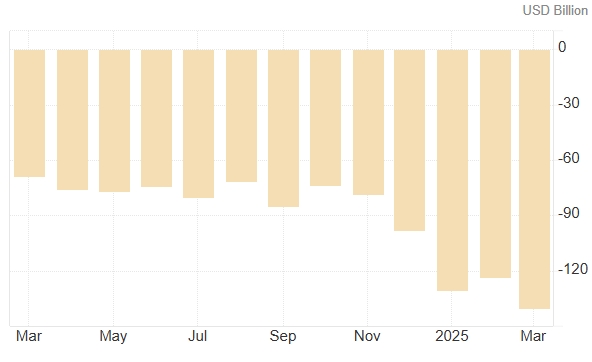U.S. Trade Deficit Surges to Record High: Trump's Tariff Short-term Pain or Strategic Failure?

TradingKey – Despite strong opposition from economists, U.S. President Donald Trump remains steadfast in his belief that raising tariffs will reduce the U.S. trade deficit. Ahead of the so-called "reciprocal tariffs" that took effect in April, American companies rushed to import goods ahead of the deadline, causing the U.S. trade deficit to widen sharply in March to a record high.
On Tuesday, May 6, 2025, the U.S. Department of Commerce released a report showing that the U.S. trade deficit in goods and services widened by 14% month-on-month in March, rising from $122.7 billion to a historic high of $140.5 billion—surpassing market expectations of $137.2 billion.

United States Balance of Trade, Source: TradingEconomics
The surge in imports, which rose 4.4% in March, was driven by businesses stockpiling goods before higher tariffs kicked in. Imports of consumer goods such as pharmaceutical preparations hit record highs, while exports edged up only slightly by 0.2%.
Analysts suggest that the rapidly expanding trade deficit was a major factor behind the first contraction in U.S. GDP since the fourth quarter of 2022. The U.S. economy shrank at an annualized rate of 0.3% in Q1 2025, with net exports dragging down GDP by 4.83 percentage points.
To reverse the long-standing trade deficit that has persisted since 1975, Trump is pursuing policies including raising tariffs to reduce imports and promoting a weaker dollar to boost exports.
However, economists broadly criticize Trump’s fixation on the trade deficit, arguing that it is not a reliable indicator of economic health. They note that trade deficits arise from a variety of factors beyond so-called “unfair” trade practices, and that tariffs may not effectively reduce the deficit.
According to the Competitive Enterprise Institute, during the past 50 years when the U.S. ran persistent trade deficits, Americans' incomes doubled and living standards improved. The trade deficit itself has no inherent positive or negative impact on economic well-being—it is neither beneficial nor harmful.
As reported by AP News, both Trump and Biden imposed tariffs, yet the trade deficit continued to grow. Last year, the U.S. trade deficit reached $918 billion, the second-highest level on record.
Beyond their limited effectiveness in reducing the trade deficit, Trump’s tariff policies have introduced significant uncertainty into business planning, increasing production costs and economic volatility.
FWDBONDS economists noted that U.S. firms are clearly scrambling to navigate this unprecedented period of policy change—but the worst may still be ahead. The new import tariffs officially took effect on April 2—"Liberation Day"—and the Trump 2.0 administration has yet to conclude any new trade agreements.







